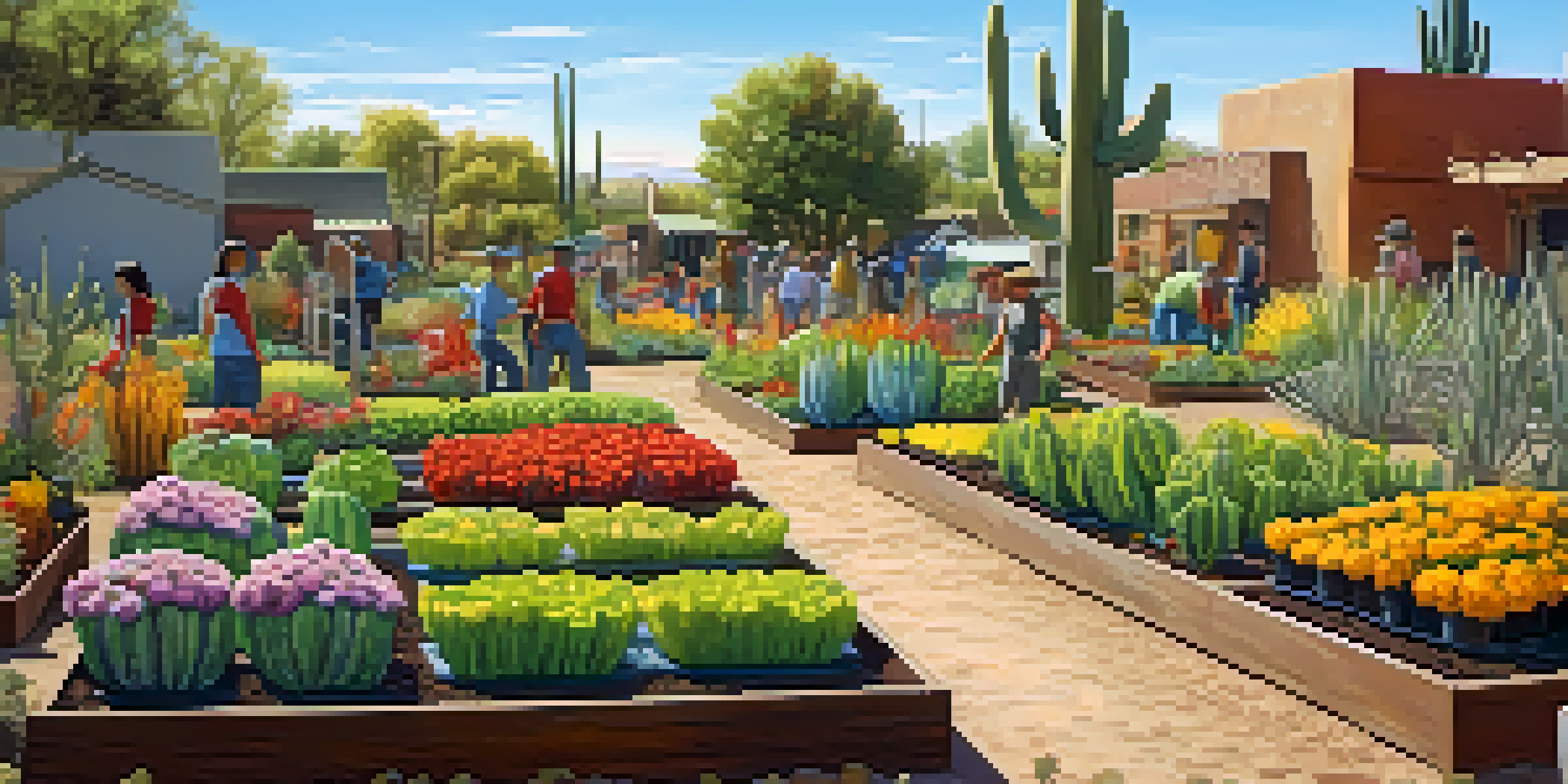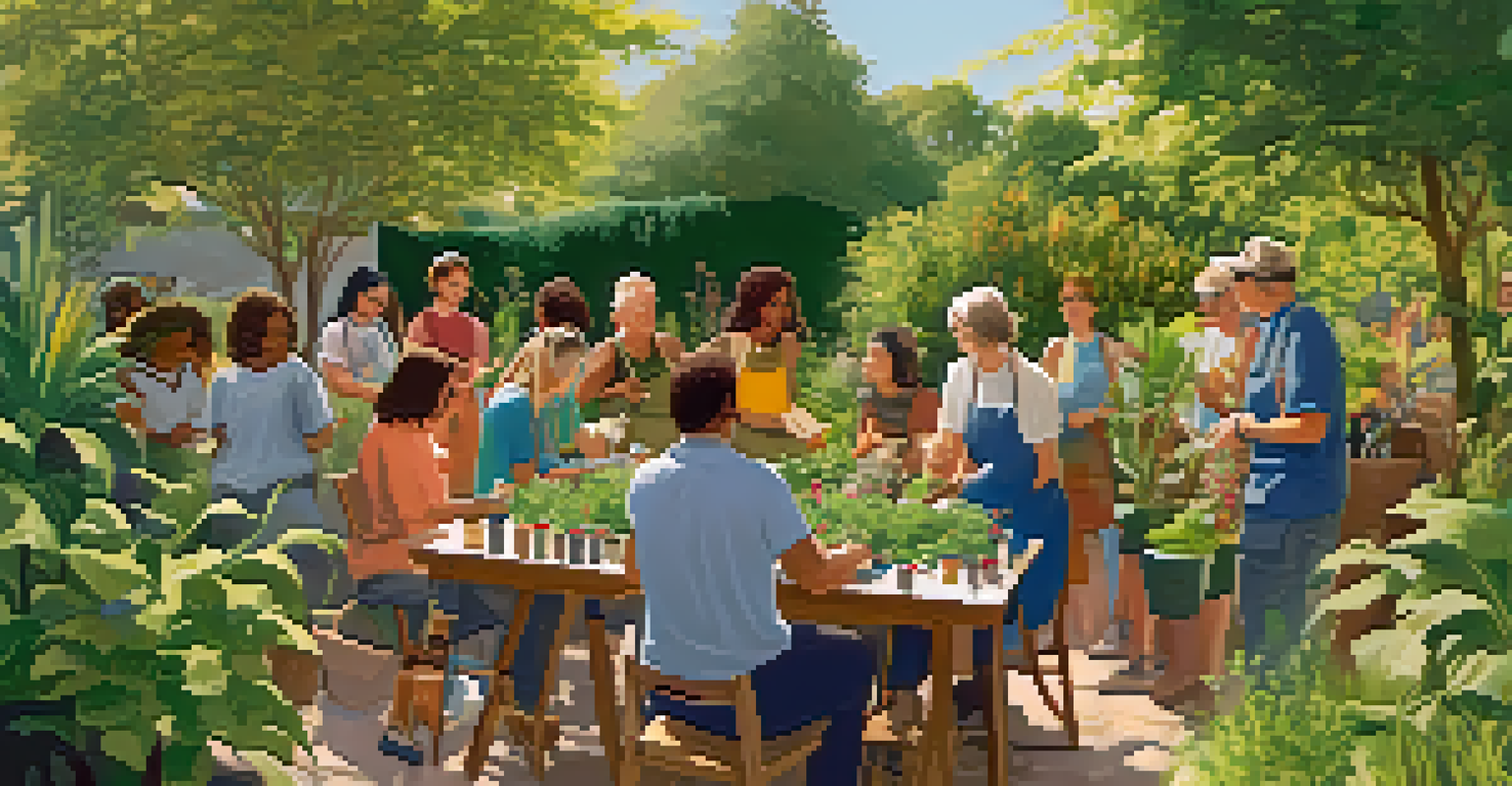The Health Benefits of Community Gardening in Arizona

Community Gardening: A Growing Trend in Arizona
Community gardening has become increasingly popular in Arizona, offering a unique way for residents to connect with nature and each other. These gardens can be found in urban areas, providing green spaces amidst the concrete jungle. They not only beautify neighborhoods but also encourage local food production and sustainability.
To plant a garden is to believe in tomorrow.
In Arizona's hot climate, community gardens serve as a sanctuary where individuals can learn about gardening techniques suitable for arid conditions. Participants often share their knowledge and experience, fostering a sense of camaraderie. This collective effort can lead to an increase in fresh produce availability, contributing to better nutrition.
Moreover, these gardens can also reflect the diverse cultures of the community, showcasing various plants and gardening styles. By promoting inclusivity, community gardening encourages people from different backgrounds to come together, making it a vital part of community life.
Physical Health Benefits of Gardening
Engaging in community gardening provides numerous physical health benefits. For starters, gardening is a form of moderate exercise that can improve cardiovascular health and increase overall fitness levels. Digging, planting, weeding, and harvesting all require physical effort, helping participants to stay active and burn calories.

Additionally, working in a garden promotes flexibility and strength, especially in the arms, legs, and core. Regular gardening can also reduce the risk of chronic diseases, such as obesity and diabetes, especially when combined with a diet rich in fresh vegetables and fruits grown onsite.
Community Gardening Enhances Wellness
Participating in community gardening promotes physical health through exercise and access to fresh produce, while also boosting mental well-being through social connections.
Furthermore, spending time outdoors while gardening can enhance vitamin D levels, which is essential for bone health and immune support. In Arizona, where sunlight is abundant, community gardeners can easily reap these benefits while enjoying the great outdoors.
Mental Health Benefits of Community Gardening
Community gardening isn't just good for the body; it's also a boon for mental health. Participating in gardening activities has been shown to reduce stress and anxiety. The simple act of tending to plants can be meditative, allowing individuals to connect with nature and find peace amidst their busy lives.
Gardening adds years to your life and life to your years.
Moreover, the social aspect of community gardening fosters a sense of belonging. Working alongside others can combat feelings of isolation and loneliness, especially for those who may struggle to connect in other settings. Celebrating shared successes, such as a bountiful harvest, can create lasting friendships.
Additionally, the creativity involved in designing and maintaining a garden can boost self-esteem and provide a sense of accomplishment. Watching plants grow and flourish as a direct result of one’s efforts can be incredibly rewarding, contributing to overall emotional well-being.
Nutritional Advantages of Homegrown Produce
One of the most significant benefits of community gardening is access to fresh, nutritious produce. Growing your own fruits and vegetables means you can enjoy them at their peak ripeness, which is often when they are most flavorful and packed with nutrients. This can lead to healthier eating habits and a greater appreciation for wholesome foods.
In Arizona, where certain crops like tomatoes, peppers, and herbs thrive, community gardeners can cultivate a wide range of seasonal produce. This not only enhances dietary variety but also educates participants about which foods are in season and how to incorporate them into meals.
Gardens Foster Environmental Health
Community gardens improve urban environments by enhancing air quality, supporting biodiversity, and educating participants on sustainable practices.
Furthermore, participating in a community garden can encourage members to experiment with cooking and trying new recipes. Sharing harvests and recipes among members can create a culture of healthy eating, benefiting the entire community's diet.
Environmental Benefits of Community Gardens
Community gardens play a crucial role in promoting environmental sustainability. By transforming vacant lots and underutilized spaces into green areas, these gardens help improve air quality and combat urban heat. Plants absorb carbon dioxide and release oxygen, contributing to a healthier environment.
Moreover, community gardens can support local biodiversity. They provide habitats for various species, including pollinators like bees and butterflies, which are essential for food production. By fostering such ecosystems, gardeners can help maintain the delicate balance of nature.
Additionally, these gardens can educate participants about sustainable practices, such as composting and water conservation. In Arizona, where water is a precious resource, learning to garden efficiently can promote responsible habits that extend beyond the garden and into daily life.
Building Stronger Communities Through Gardening
Community gardening has the power to unite individuals and strengthen neighborhoods. By working together towards a common goal, participants cultivate relationships that may not have formed otherwise. This sense of teamwork can lead to improved community cohesion and collaboration on various projects.
In Arizona, where diverse populations coexist, community gardens can serve as a bridge between cultures. They provide a platform for sharing traditions, recipes, and gardening techniques, fostering mutual respect and understanding. This cultural exchange can enrich the community and create a more inclusive environment.
Strengthening Community Bonds
Through collaboration in gardening, individuals from diverse backgrounds can build relationships, share cultures, and inspire further community initiatives.
Moreover, successful community gardens often inspire further community initiatives, such as farmers' markets or local food cooperatives. These projects can enhance the local economy, promote sustainability, and reinforce the idea that collective efforts yield greater benefits.
Getting Involved in Community Gardening in Arizona
If you're interested in reaping the benefits of community gardening, getting involved is easier than you might think. Arizona boasts numerous community gardens that welcome new members, regardless of gardening experience. Many organizations offer workshops and resources to help beginners learn the ropes, making it accessible for everyone.
Joining a local gardening group can provide opportunities for hands-on learning and social interaction. Many gardens host regular events, such as potlucks or planting days, where members can connect and share their progress. This sense of community can be incredibly motivating and rewarding.

Lastly, consider starting a community garden if there isn't one nearby. Gather like-minded individuals and explore available spaces, such as parks or vacant lots. With the right planning and community support, you can create a thriving garden that brings people together and enhances the local environment.